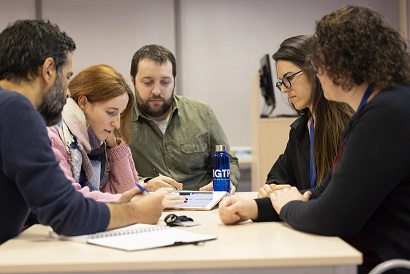GCAT for Researchers
GCAT health databank

GCAT health databank is a collection of health data and samples from participants of The GCAT/Genomes for Life. Cohort Study of the Genomes of Catalonia Study. The study is conducted in several waves of data gathering, namely GCAT1, the baseline Survey from 2014-2017 and GCAT2, the GCAT follow-up in the second year. Data collection is done with web-based self-questionnaires, direct interviews, clinical data and analyses of DNA blood derived samples. GCAT HD contains blood serum and plasma samples, as well as Living White cells, criopreserved in GCAT, which can be picked and defrosted for further analyses or biological markers. GCAT is a supported access resource.
The GCAT Study has the following characteristics:
- GCAT HD includes a large number of samples from participants collected with identical and standardized protocols over a period of four years. The GCAT1 survey has now 13.000 enrolled participants. The age range of the participants is from 40 to 67 years old.
- All participants were inhabitants of Catalonia at the time of participation, which is a limited geographical area in the northeast Spain. See GCAT Origin map .
- The population background is relatively homogeneous, with 16% non-Caucasian, mostly from American-Hispanic origin. See GCAT Ethnic Background .
- The population is in many aspects representative of the whole of country and includes a diverse and rich representation of environmental living areas; small rural areas, coastal areas, medium-high mountain areas as well as big urban cities.
- Thanks to the large amount of health information on the GCAT HD, adding up to more than 300 variables for some participants, the GCAT Study is suitable for a broad range of research topics.
- By express individual consent all Health Related information linked to the Health Personal Identification Number is available for GCAT research purposes. This means that data from the GCAT Study can be linked with Health Public registries such as Medical Registry, Drug prescription Registry, Cancer Registry, Causes of Death and local health registries from hospitals containing patient diagnoses.
- GCAT is a supported access resource and supports to make genetic data broadly available to further scientific research, but believes that controls over access will help ensure protection of the privacy of those individuals who have agreed to have their genomic sequencing data placed in the GCATdatabase, as well as that of their family members.
- Strict ethical rules for how data can be used or linked are followed to secure privacy protection, and each project needs to be approved by the regional Medical Ethical Committee. Information that could identify persons directly is always erased to prevent identification of individuals by researchers.
Researchers wishing to use the GCAT should make an Initial Transmission Request. For the full regulations regarding access please see the section on Ethical, Legal and Social Implications (ELSI) in the section on GCAT Data Access, all the documents required to make a request are in the section Data Access Documents.
For specific questions regarding the research please contact Dr Rafael de Cid, Scientific Director of the GCAT. Rafael de Cid, PhD rdecid(ELIMINAR)@igtp.cat (+34) 93 557 28 39
GCAT Web Association Analysis
Here you can access to the GCAT Pheweb, a web where you can visualize the results from a GWAS analysis trying to find out pleiotropy among SNPs and genes.





